5 Signs That You May Have Premenstrual Dysphoric Disorder (PMDD)
Do you feel like a completely different person in the lead up to your period? Crying at the drop of a hat, lashing out at your partner or feeling unable to get out of bed can all be common symptoms of the monthly rollercoaster.
Premenstrual syndrome (PMS) occurs in the second half of the menstrual cycle during the luteal phase. Typically this can begin up to 5 days prior to the start of your period and is usually resolved once your bleed starts. There are various symptoms of PMS which can include headaches, anxiety, irritability, feeling sad or teary, tender breasts and fluid retention that can make you feel ‘puffy’ and swollen.
However, for up to 8% of people who menstruate, a more severe and debilitating form of PMS is experienced each cycle. This is known as Premenstrual Dysphoric Disorder (PMDD) and is generally when these symptoms grow to a level where they are interfering with your daily life and relationships, preventing you from doing the things you want to do. Symptoms of PMDD may also worsen during the menopausal transition.
Five signs that you may be experiencing PMDD
Over the past 12 months, in the lead up to your period, you have experienced the following:
A dramatic and/or sudden change in mood. This can look like severe anxiety, feelings of panic, sadness/depression and/or anger. For some people, they can feel very down about themselves and feel hopeless.
A loss of interest in activities that you usually enjoy, difficulty getting through everyday tasks or feeling overwhelmed/unable to manage, in comparison to how you feel in the early part of your cycle (follicular phase).
Significant changes to eating habits such as specific food cravings, changes to appetite or binge eating.
Feeling exhausted all the time, lacking energy, needing more sleep or suffering from insomnia.
PMS symptoms such as bloating, breast soreness, headaches, brain fog and/or pain in your muscles or joints.
There can also be an increased sensitivity to light or sound during this time. Some people describe PMDD as feeling like you have been stripped of the protective layers that normally help you to navigate the world.
What should I do if I suspect I have PMDD?
Take notes
It is helpful to keep a log of your symptoms over at least 2-3 menstrual cycles - write down when you first noticed symptoms occurring, what they were and how severe (you may like to rate these from 1-10). There are many period tracker apps that can help with record keeping.
Seek support
A healthcare professional who works in this area can assess your symptoms and discuss treatment options. Often a multidisciplinary approach will be highly beneficial. Naturopaths can help to support you with PMS/PMDD utilising a range of options such as herbal medicines, custom blended nutritional powders and high quality practitioner supplements. Where mood is significantly impacted, mental health support such as psychology, counselling or psychotherapy has also been shown to be beneficial. If you are feeling hopeless and need someone to talk to immediately, Lifeline is always available on 131114.
Move your body
Where you can, aim to engage in some aerobic exercise every day such as swimming, dancing, running, cycling, or where your energy levels are low, even a short walk can be beneficial.
Food as medicine
Focus on eating sufficient amounts of complex carbohydrates (such as wholegrains, legumes, beans and vegetables), protein, and healthy fats such as avocado or olive oil. Minimise foods that cause spikes in your blood glucose levels such as refined sugar and white bread.
Nourish your nervous system
This can look different for everyone and might include practices such as yoga, meditation, journaling, spending time in nature, art and crafts and listening to soothing music.
Importantly, know that you are not alone and help is available.


